#taylor swift amc awards
Explore tagged Tumblr posts
Text

“Music's always been at the heart of Apple. It's deep in our DNA.” Tim Cook
#taylor swift#country#billboard#comedy#friendship#apple music#itunemusic#tim cook#ceo information#limbus company#superman#global news#music is life#rick and morty#guns n roses#rock’n’roll#spandau ballet#mtv jackass#mtv unplugged#elvis fans#elle fanning#leann rimes#tony awards#grammys#beyonce#dolly parton#buffy the vampire slayer#amc the walking dead#cma awards#austin texas
1 note
·
View note
Link
Hollywood Week: AMC Credits Concert Films for Revenue Boost, Pro Baller Sentenced, Richard Lewis, Iris Apfel #janetwalker #hautelifestylecom #theentertainmentzonecom #hollywood #hollywoodweek #oscars2024
#Janet Walker#Haute-Lifestyle.com#The-Entertainment-Zone.com#iris apfel#richard lewis#larry david#amc#Taylor Swift#beyonce#concert films#oscars 2024#academy awards
1 note
·
View note
Text
One notable nomination is megastar Taylor Swift’s “The Eras Tour” in the music documentary category. The re-capturing of the pop star’s sold-out SoFi Stadium show in Los Angeles is coming off a record-breaking opening weekend, grossing the biggest opening for a concert film of all-time with $95 to $97 million, surpassing “Justin Bieber: Never Say Never” (2011). If “Eras Tour” ended up grossing the higher end of that range, it will become largest October opening ever in North America, surpassing “Joker” (2019) at $96 million. Unfortunately, this can’t translate to Oscar attention, as the film isn’t eligible under the Academy’s current rules (and neither is the upcoming Beyoncé one).
Music Documentary
“American Symphony” (Netflix)
“Carlos” (Sony Pictures Classics)
“Ladies First: A Story of Women in Hip-Hop” (Netflix)
“Little Richard: I Am Everything” (Magnolia Pictures/CNN Films)
“Love to Love You, Donna Summer” (HBO)
“Taylor Swift: The Eras Tour” (AMC Theatres)
“What the Hell Happened to Blood, Sweat & Tears?” (Abramorama)
19 notes
·
View notes
Text
The Swift Agenda 02 | Aug. 16 to Sep. 20, 2023
Taylor Swift — all the way from the physical and digital sales era — has now surpassed the unstoppable force, streaming juggernaut Bad Bunny as the #2 most-streamed artist in Spotify history.
Despite giving the industry a massive head start in algorithm dominance by removing her music at her peak (2014–2017) and thus losing out on Spotify’s crucial audience-building years, Taylor Swift is now only behind the king of streams, Drake, in the all-time rank and is vying for the Spotify crown as she continually DOUBLES his numbers (with a whopping 40M+ lead) on a daily basis.
It would take her approximately 4 months to ultimately close the 5-billion gap standing between her and the highly coveted title — with the impending release of 1989 (Taylor’s Version) more than ready to offset whatever damage that a new Drake album may cause in the near future.
Taylor Swift has surpassed Metallica and is now the #19 best-selling artist of all time (via @chartmastersorg ), shifting 168,860,000 equivalent album units since the start of her legendary seventeen-year career, solidifying her status as the de facto leader of today’s music industry and widening the ASTRONOMICAL gap between her and the remaining 21st-century artists in the all-time Top 100 (with the nearest one having 121M):
— Taylor in the 160M–169M range — 0 artists in the 150M–159M range — 0 artists in the 140M–149M range — 0 artists in the 130M–139M range — 5 artists in the 100M–129M range — 5 artists in the 80M–99M range — 5 artists in the 60M–79M range
Taylor Swift’s “The Eras Tour” movie takes the world by storm as it shatters the 24-hour pre-sales record in AMC’s eleven-decade history, edging out several Marvel blockbusters.
With its STAGGERING demand, it will swiftly claim the title for the biggest concert film of all time (and beyond) upon its October 13 release.
Taylor Swift’s “reputation” has surpassed 6 billion streams on Spotify, making her the ONLY artist in history with 4 different albums achieving this feat (Lover, 1989, Midnights, and reputation).
With “folklore” merely 60M+ streams away, Taylor Swift will very soon have FIVE different albums surpassing the 6B milestone — one that is supposedly reserved for A-list artists’ absolute, definitive, career-defining PEAK eras. And, once again, just to let it sink in: she is about to have FIVE.
Taylor Swift has spent SEVERAL more weeks at #1 on Billboard Artist 100, extending her all-time record to 79 weeks.
— Nearest male: 37 — Nearest female: 20 — Nearest group: 21
Taylor Swift’s “Lover” is now the #6 most-streamed female album in Spotify history, surpassing Ariana Grande’s “thank u, next”, becoming the FIRST among the SEVERAL Taylor Swift albums projected to do so.
With 1989 (Taylor’s Version)’s preorders alone ALREADY surpassing folklore’s actual first-week debut (846K), the pop bible’s re-recording is poised to OBLITERATE its predecessor’s original numbers in 2014 (1.287M) and even challenge the streaming-era giant “Midnights” (1.578M) for the biggest Billboard 200 debut for any streamable album ever.
Currently, GoldDerby predictions put Taylor Swift at the helm of the upcoming GRAMMYs:
— #1 frontrunner for AOTY — #1 frontrunner for SOTY — #2 frontrunner for ROTY
Taylor Swift has tied the record for the most VMAs wins in a single night, bagging 9 out of 11 awards and SWEEPING all major categories.
She now holds the all-time winning records for the BIGGEST categories in the VMAs, AMAs, and GRAMMYs.
— most wins for VMAs “Video of the Year” (4x) — most wins for AMAs “Artist of the Year” (7x) — most wins for GRAMMYs “Album of the Year” (3x; tied with Stevie Wonder and Frank Sinatra)
Going way beyond everyone’s wildest dreams, 33 MILLION PUZZLES for the 1989 (Taylor’s Version) Vault were SOLVED in less than a day on Google, signaling an earthshaking demand for what is shaping up to be THE most powerful album release of the decade.
17 notes
·
View notes
Text
Hayao Miyazaki’s ‘The Boy and the Heron’ opens to record-breaking $12.8 million

“The Boy and the Heron,” a fantastical coming-of-age story from animation maestro Hayao Miyazaki, earned $12.8 million in its opening weekend, becoming the first original anime production to top the domestic box office. The GKids release is showing in Imax and other premium large format auditoriums, which bolstered its record-breaking revenues and helped secure its first place finish. It also benefitted from a lack of big-screen offerings, with holiday blockbusters such as “Wonka” and “Aquaman and the Lost Kingdom” still waiting to make their debuts in the coming weeks.
“The Boy and the Heron” marks Miyazaki’s unexpected return to screens after being absent for more than a decade — the filmmaker behind classics like “Spirited Away” and “Princess Mononoke” announced he was retiring in 2013 when his previous film, “The Wind Rises,” was released. “The Boy and the Heron” has slowly been rolling out internationally, earning $84 million, with $56 million of that coming from Miyazaki’s native Japan.
Last weekend’s champ, “Renaissance: A Film by Beyoncé,” tumbled in its second weekend, earning $5 million for a fifth place finish. That’s a precipitous 77% drop, signaling that the music icon’s concert film may not have the staying power of “Taylor Swift: The Eras Tour,” which has grossed nearly $180 million. “Renaissance” has earned roughly $28 million domestically. Like Swift, Queen Bey has bypassed a traditional studio in order to release her film, enlisting AMC Theatres to oversee its distribution. That allows her to keep a larger share of the ticket sales.
As “Renaissance” faltered, Lionsgate’s “Hunger Games: The Ballad of Songbirds and Snakes” took second place, picking up $9.4 million to push its domestic haul to $135.6 million. That’s a solid number, particularly considering that the “Hunger Games” prequel carries a $100 million production budget, a modest figure for a film of that size and scope.
Toho International’s “Godzilla Minus One” continued its hot streak, stomping to $8.3 million in its second weekend. The monster movie’s domestic haul stands at $25.3 million, making it the highest-grossing live-action Japanese film to be released in North America.
Universal and DreamsWorks Animation’s “Trolls Band Together” will take fourth place, earning $6.2 million. That brings the family film’s total to $83.1 million. One of the weekend’s other new offerings, Bleecker Street’s “Waitress: The Musical,” earned $3.2 million.
In limited release, Searchlight’s “Poor Things” earned a sterling $644,000 from just nine theaters. Its per-theater average of $72,000 is also the best of the fall awards season — it falls slightly behind the per-theater bows of “Beau Is Afraid” ($80,000) and “Asteroid City” ($142,000), which came out in the spring and summer. The off-beat comedy from Yorgos Lanthimos, the director of “The Favourite,” stars Emma Stone and has been generating plenty of Oscar buzz since it debuted at the Venice Film Festival, where it won the prestigious Golden Lion.
“Origin,” another critical favorite, opened in limited release with $117,063 from two theaters. That’s a per-screen average of $58,532. The Neon release is written and directed by Ava DuVernay and adapts Isabel Wilkerson’s “Caste: The Origins of Our Discontents,” a historical examination of hatred and racism.
Next weekend brings the release of “Wonka,” a look at the early days of the candy maker that stars Timothée Chalamet. That should sweeten the box office, but theater owners and analysts believe this holiday season will be more muted than the prior two years, when the mega-grossing “Avatar: The Way of Water” and “Spider-Man: No Way Home” debuted
5 notes
·
View notes
Text
0 notes
Text

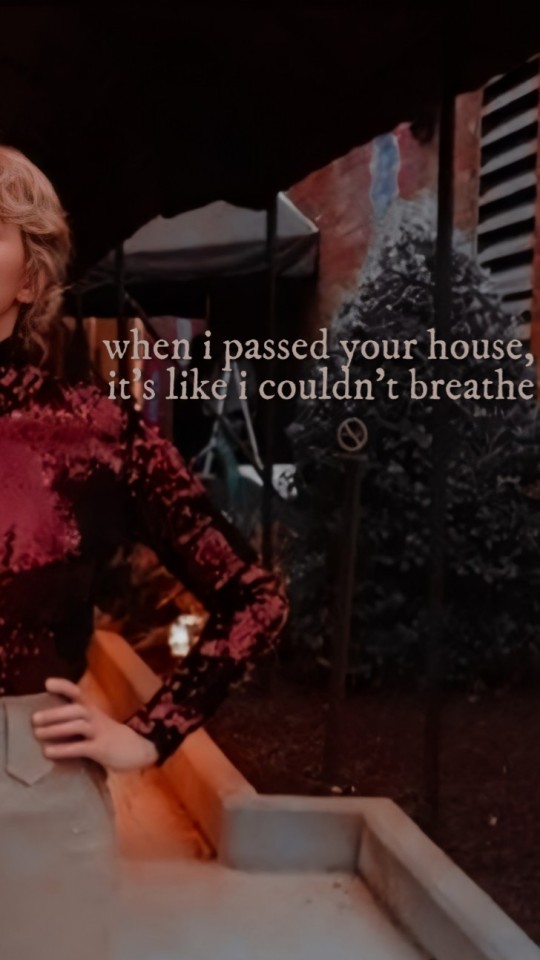


taylor swift x lockscreens
-like or reblog if u save
#aesthetic#art#aesthetics#taylor swift memes#taylor swift layouts#taylor swift headers#taylor swift wallpaper#taylor swift#taylor swift icons#taylor swift lockscreen#taylor swift packs#acm awards#taylor swift amc awards#betty#folklore#folklore icons#folklore headers#taylor swift folklore#folklore album#folklore lockscreen#folklore layout
70 notes
·
View notes
Text

24 notes
·
View notes
Text
Billboard’s Greatest Pop Stars of 2021: #1 - Taylor Swift
By: Jason Lipshutz for Billboard Date: December 16th 2021

“You guys turned a hard thing into a very, very wonderful experience,” Taylor Swift told an audience of diehard fans at a November screening of her All Too Well short film at New York City’s AMC Lincoln Square theater. Before unveiling the self-directed companion piece to the 10-minute version of the fan favorite epic of the same name, featured on the re-recorded Red (Taylor’s Version), Swift expressed gratitude to a group of supporters that helped turn a non-single breakup track from her original 2012 album into a signature song worthy of expanding past the double-digit minute mark. “All Too Well” could have been little more than a personally revealing footnote to her career, Swift pointed out; instead, the fans identified its intimate power, championed it, and ultimately revived it, to create one of the most eagerly anticipated revisited songs in pop history. “All of this is happening,” Swift told her audience, “because you made this happen.”
Well, yes and no. Swift is correct that the fandom that gathered around “All Too Well” - a long-form songwriting feat, with some of the most evocative lyricism of Swift’s career - in the nine years since its original release helped clear the path for “All Too Well (10-Minute Version)” as a capital-E Event stretching beyond the Swifties into the mainstream. Yet she deserves a ton of credit herself: No other popular artist harnessed that type of fan energy with as much passion and imagination in 2021 as Swift, across albums and platforms, on projects that challenged the modern music industry while still succeeding wildly within it.
Swift began 2021 still riding high from a triumphant 2020 – a year she reasonably could have taken off, having delivered her Lover album in August 2019 and watched her planned Lover Fest stadium shows fall victim to the pandemic the following year. Instead, Swift fell down a musical rabbit hole that yielded two full albums and, in hindsight, catered perfectly to her songwriting strengths. The first one, Folklore scored the largest debut week for an album in 2020 upon its July release, and companion piece Evermore earned the fifth-largest in December, both ending 2020 and starting 2021 atop the Billboard 200 albums chart.
With Evermore, Swift continued the sonic reinvention kick-started by Folklore, an unexpected alt-folk exploration recorded in secret during quarantine with indie vets like The National’s Aaron Dessner and Bon Iver’s Justin Vernon. Evermore would go on to spend three total weeks atop the Billboard 200 in 2021. Meanwhile, its hushed, woodsy single “Willow,” which launched atop the Hot 100 in December alongside the album release, grew into a radio success in the spring, ascending to No. 1 on Billboard’s Adult Pop Airplay chart in April.
Before that, however, Swift won another album of the year trophy. At the 63rd Annual Grammy Awards in March, Folklore took home the top prize — the third of Swift’s career, following wins for Fearless at the 2010 ceremony and 1989 in 2016. Not only did the win help Swift enter the record books, as the fourth artist overall and only woman with three album of the year wins (following Frank Sinatra, Stevie Wonder and Paul Simon), the accomplishment was also a bit of personal validation after Swift’s two previous albums, 2017’s Reputation and 2019’s Lover, were not even nominated in the top category. Once again, Swift thanked the fans, this time for embracing the artistic swerve of her 2020 output: “You guys met us in this imaginary world that we created,” she said in her acceptance speech, “and we can’t tell you how honored we are forever by this.”
One month later, Swift returned to that first album of the year winner of hers. In April, Fearless (Taylor’s Version) kicked off the behemoth endeavor of re-recording her first six studio albums. Announced in 2019, the project followed the acquisition of Swift’s master recordings by Scooter Braun’s Ithaca Holdings, as a way for her to essentially reclaim ownership over the period of her career that made her a household name. What could have been an industry curiosity based around a rights dispute instead played out like a widescreen revisit to a pivotal era of Swift’s career, as hits like “You Belong With Me” and “Love Story” were lovingly re-created, and previously unreleased tracks from the Fearless recording sessions were finally unveiled as “From The Vault” treasures.
The amount of care that Swift put into Fearless (Taylor’s Version) turned the 26-track set into a must-hear remake of the diamond-certified original, and fans embraced it as such. The full-length became the first re-recorded version of a previous No. 1 album to top the Billboard 200 albums chart upon its release, with the biggest debut week of 2021 at the time with 291,000 equivalent album units, according to MRC Data.
It wasn’t the only way that Swift’s towering legacy cast a shadow over the first half of 2021, either. In between the April release of Fearless (Taylor’s Version) and the June announcement that Red (Taylor’s Version) would be the next re-recorded album to arrive in November, Swift proved a key influence, and contributor, to another artist’s year-defining album. Pop singer-songwriter Olivia Rodrigo hasn’t been shy about her love of Swift’s music over the course of her breakout year, name-checking the superstar as a sonic and spiritual guide when “Drivers License” was released back in January, and receiving an Instagram shout-out from Swift during the debut single’s quick ascent.
Rodrigo’s debut album Sour took the adoration even further upon its May release: the heart-wrenching piano ballad “1 Step Forward, 3 Steps Back” borrowed from Swift’s own heart-wrenching piano ballad, 2017’s “New Year’s Day,” resulting in Swift and Jack Antonoff being listed as writers on the track. Two months after the album’s release, Rodrigo also added Swift, Antonoff and Annie Clark as co-writers to the post-breakup reflection “Deja Vu” due to the bridge’s similarities to Swift’s own complex-romance remembrance, 2019’s “Cruel Summer.” Rodrigo is pop’s rookie of the year with 2021’s biggest breakthrough album - which Swift gets some of the credit for, in ways both figurative and literal.
Delays in the vinyl shipping of Evermore pushed the album back to the top of the Billboard 200 when the record was finally sent out to fans in June, displacing Sour at #1 for a nice bit of teacher-student pop interplay. Swift stayed active all summer, guesting on two songs on How Long Do You Think It’s Gonna Last?, the latest album from Dessner’s Big Red Machine project - a charming continuation of the Folklore/Evermore era of gentle songwriting and rustic textures - and tossing out the Taylor’s Version re-recording of 1989’s “Wildest Dreams��� to have a little fun with an unexpected viral moment the song was enjoying on TikTok.
But by then, the 1989 era wasn’t the one fans were anxiously awaiting to revisit. If Red (Taylor’s Version) had simply matched Fearless (Taylor’s Version) in terms of fanfare and listenership, Swift’s year would have still been pretty spectacular. Instead, her second re-recorded album wildly outpaced its predecessor in nearly every way, turning the release of “All Too Well (10-Minute Version)” into a cultural sensation - The short film! The remarkable SNL performance! The new lyrical allusions that launched a thousand Jake Gyllenhaal jokes! - and another chart-topper for Swift. With its November debut atop the Hot 100, “All Too Well (Taylor’s Version)” also became the longest #1 in the chart’s history - in the age of TikTok virality and dwindling attention spans, no less.
The expanded “All Too Well” wasn’t the only new revelation from the set, which also boasted new collaborations with Phoebe Bridgers, Ed Sheeran and Chris Stapleton on old “From The Vault” tracks; the Stapleton team-up, “I Bet You Think About Me,” has been getting airplay on Swift’s old stomping grounds of country radio. In the end, Red (Taylor’s Version) drove as much conversation as any of Swift’s recent all-new studio albums, and scored a blockbuster debut, with 605,000 first-week equivalent album units moved - good for the third-best debut week of 2021 with, it bears repeating, the majority of its songs released nearly a decade earlier.
Even without a proper new album in 2021, Swift sent three separate projects to the top spot of the Billboard 200 during the calendar year - the first female artist to accomplish that feat in the chart’s 65-year history. And in November, one final domino fell for Swift’s re-recordings project when iHeartRadio announced that it would now only be playing Taylor’s Versions of her older hits from each album as they rolled out - after streaming platforms had already given them prominent placement on main pages and major playlists. In addition to the impressive sales of her re-recorded albums, the reactions from the streaming and radio worlds underline the widespread acceptance that these new recordings have replaced the classic versions as the ones listeners will be digesting and caring about moving forward.
As Swift enters 2022, she once again has the chance to make history: Evermore is nominated for the album of the year Grammy, and a victory at the Jan. 31 ceremony would make her the most celebrated artist in the 64-year history of the category. While other popular artists are rightfully celebrating award nominations and chart achievements, Swift can do both, while also credibly changing the way artists can approach creative ownership and sonic shifts. If Swift changed the game in the mid-2010s when pivoting from country to pop, playing it top 40’s way and earning the splashiest commercial wins of her career, including the distinction of also being Billboard’s Greatest Pop Star of 2015, the past year found her rejecting the game entirely and drawing up her own rules. Now, she has the power to pull any sound she wants into her mainstream orbit, or make any industry institution reckon with her impact. She could release a 20-minute version of a song on her next re-recorded album, and you’d be foolish to bet against it becoming a hit.
Taylor Swift is making the type of moves within and outside of her music that elevate an artist from superstar to legend. Those moves are often very hard to execute, but no one who had been paying attention was the least bit surprised when she stuck each landing. Wind in her hair, Swift is here, and making it look all too easy.
#niceee#taylor swift#billboard#about taylor#evermore era#re-recording#legendary stuff#breaking records
57 notes
·
View notes
Text

M3GAN and the History of January Horror
January, for the longest time, has seemingly become a month for film devoted to three things: films seeking awards attention, films still playing from the holidays, and horror movies.
As long as I can remember, January has been a dumping ground for less-than-stellar horror flicks that studios unfortunately leave to die in cinemas. The vast majority of them being disliked by critics and audiences alike. Despite this, they often end up still making enough to break even due to their low price tags and advertising costs.
However, when the trailer for “M3GAN” first dropped a few months ago and people saw that January release date, the sense of worry surrounding January released horror was immediately overshadowed by incredibly high levels of hype. From a M3GAN Twitter account to gifs of the android doing kicks and flips to even a surprise remixed Taylor Swift deep cut, the film already had audience members in love and optimistic for the film.
Now, it seems our new murderous android bestie is officially dancing her way past the January horror curse after being released in theaters with stellar reception. With a 95% on Rotten Tomatoes, and close to $3 million in revenue from previews. “M3GAN” is projected to gross up to $20 million in its opening weekend alone, exceeding its $12 million budget breaking even in its first weekend alone.
If it opens higher than expected, it could even challenge “Avatar: The Way of Water” for the number one spot. However, my new favorite killer robot will face other horror competition almost every weekend of this month, so it will be very interesting to see how, and if, she is able to fend off the competition.
As for the film itself, “M3GAN” is as much fun as it looks to be. It was much funnier than expected, and even moments that were scary couldn’t helped but to be laughed with. Allison Williams once again shows that she is phenomenal in horror performances, and child actor Violet McGraw holds her own incredibly well in every scene, seemingly knowing how to perfectly balance the sadness and humor her character possesses.
The standout, of course, is the titular android, played with perfect terror and comedy by Amie Donald and voiced to terrifying comedic brilliance by Jenna Davis. M3GAN is going to become an iconic horror staple incredibly quickly because of their joint work to create such a scary and hilarious antagonist.
The film also beautifully comments on grief and the ways we act and things we do in those moments to help or hide our emotions. Williams and McGraw are the emotional core of the film, and both are able to perfectly keep that in tact while all of the murderous and hilarious shenanigans go on around them.
This is one movie worthy of the theater experience. My entire theater was perfectly in tune with the film. The film ended in applause, something I hadn’t seen at an AMC in a very long time. It’s clear people love M3GAN, and I really hope M3GAN loves us back.
6 notes
·
View notes
Text
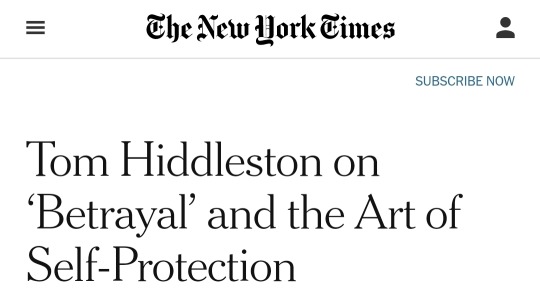
The screen and stage star is making his Broadway debut as the bottled-up husband wearing a “mask of control” in Harold Pinter’s romantic triangle.

[ By Laura Collins-Hughes
Aug. 21, 2019, 5:00 a.m. ET ]
Tom Hiddleston was posing for a portrait, and the face he showed the camera wasn’t entirely his own.
That had been his idea, to slip for a few moments into the character he’s playing on Broadway, in Harold Pinter’s “Betrayal”: Robert, the cheated-on husband and backstabbed best friend whose coolly proper facade is the carapace containing a crumbling man. And when Mr. Hiddleston became him, the change was instantaneous: the guarded stillness of his body, the chill reserve in his gray-blue eyes.
“It’s interesting,” Mr. Hiddleston said after a while, analyzing Robert’s expression from the inside. “It gives less away.” A pause, and then his own smile flickered back, its pleasure undisguised. “O.K.,” Mr. Hiddleston announced, himself again, “it’s not Robert anymore.”
It was late on a muggy August morning, one day before the show’s first preview at the Bernard B. Jacobs Theater, and Mr. Hiddleston — the classically trained British actor best known for playing the winsomely chaotic villain Loki, god of mischief and brother of Thor, in the Marvel film franchise — had been in New York for less than a week.

He’ll be here all autumn for the limited run of the production, a hit in London earlier this year, but he wasn’t going to pretend that he’d settled in. “I literally have never sat in this room before,” he’d said at the top of the photo shoot, in his cramped auxiliary dressing room, next door to the similarly tiny one he had been occupying.
He’d had nothing to do with the space’s camera-ready décor. So there was no use making a metaphor of the handsome clock with its hands stopped at 12 (“Betrayal” is famous for its reverse chronology; far more apt if the clock had run backward), or of the compact stack of pristine books that looked like journals, with pretty covers and presumably empty pages: a bit off-brand for Mr. Hiddleston, who at 38 has a model-perfect exterior with quite a lot inscribed inside.
Take the matter-of-fact way he said, in explaining that he’d first encountered Pinter’s work when he studied for his A-levels in English literature, theater, Latin and Greek: “It was a real tossup between French and Spanish or Latin and Greek. I thought, I can always speak French and Spanish, I can’t always read Latin and Greek, so I’ll study that and I’ll speak the other two.”
Though, to be fair, he only said that because I’d teased him slightly about the Latin and Greek, and I’d teased him — not a recommended journalistic technique — because he was so disarmingly good-humored and resolutely down to earth, chatting away as he waited for the photographer to set up a shot. It didn’t seem like it would ruffle him. He laughed, actually.
From a one-night reading to Broadway
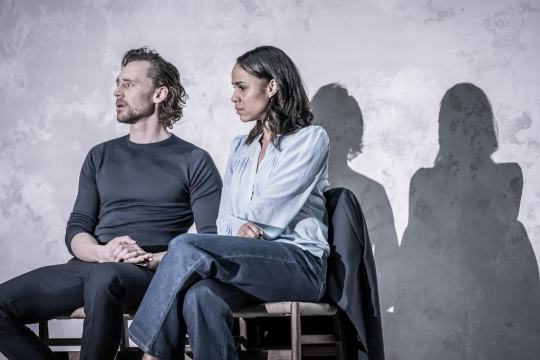
In this country, Mr. Hiddleston is mainly a screen star, known also for playing Jonathan Pine in the John le Carré series “The Night Manager” on AMC. There are plans, too, for him to bring Loki to Disney’s streaming service in a stand-alone series.
But at home in London, he has amassed some impressive Shakespearean credits, including the title roles in Kenneth Branagh’s “Hamlet” and Josie Rourke’s “Coriolanus,” and a turn as Cassio in Michael Grandage’s “Othello” — a production that Pinter, saw some months before he died in 2008. That was the year Mr. Hiddleston won a best newcomer Olivier Award for Cheek by Jowl’s “Cymbeline.”
Jamie Lloyd’s “Betrayal,” which has a staging to match the spareness of Pinter’s language and a roiling well of squelched emotion to feed its comedy, is Mr. Hiddleston’s Broadway debut. Likewise for his co-stars, Zawe Ashton (of Netflix’s “Velvet Buzzsaw”), who plays Emma, Robert’s wife; and Charlie Cox (of Netflix’s “Daredevil”), who plays Emma’s lover, Jerry, Robert’s oldest friend.
Beginning at what appears to be the end of Robert and Emma’s marriage, after her yearslong affair with Jerry has sputtered to a stop, it’s a drama of cascading double-crosses. First staged by Peter Hall in London in 1978 — and in 1980 on Broadway, where it starred Roy Scheider, Blythe Danner and Raul Julia — it rewinds through time to the sozzled evening when Emma and Jerry overstep the line.
The most recent Broadway revival was just six years ago, directed by Mike Nichols and starring Daniel Craig as Robert, Rachel Weisz as Emma and Rafe Spall as Jerry. It might seem too soon for another, let alone one with sexiness to spare — except that Mr. Lloyd’s production is also marked by a palpable hauntedness and a profound sense of loss.
Reviewing the London staging in The New York Times, Matt Wolf called it “a benchmark achievement for everyone involved,” showing the play “in a revealing, even radical, new light.” Michael Billington, in The Guardian, called Mr. Hiddleston’s performance “superb.”
What’s curious is that Mr. Hiddleston, so good at bad boys, isn’t playing Jerry, the more glamorous role: the cad, the pursuer, the best man who goes after the bride. But Mr. Lloyd said that casting him that way was never part of their discussions.
Last fall, when Mr. Lloyd persuaded Mr. Hiddleston to read a scene with Ms. Ashton for a one-night gala celebration of Pinter in London, part of the season-long Pinter at the Pinter series, there was no grand plan. Having asked Mr. Hiddleston about a possible collaboration for years, since “just before he became ridiculously famous,” Mr. Lloyd said, this was the first time he got a yes.
“I just really admired his craft of acting, the precision of his acting, as well as his real emotional depth and his real wit,” Mr. Lloyd said. “And he’s turned into what I think is the epitome of a great Pinter actor. Because if you’re in a Pinter play, you have to dig really deep and connect to terrible loss or excruciating pain, often massive volcanic emotion, and then you have to bottle it all up. You have to suppress it all.”
This, he added, is what Mr. Hiddleston does in “Betrayal,” where characters’ meaning is found between and behind the words, not inside them.
“Some of the pain that he’s created in Robert, it’s just unbearable, and yet he always keeps a lid on it,” Mr. Lloyd said.
The scene Mr. Hiddleston and Ms. Ashton read at the gala appears at the midpoint of “Betrayal”: Robert and Emma on vacation in Venice, at a moment that leaves their marriage with permanent damage. Within days, Mr. Hiddleston told Mr. Lloyd that he was on board for a full production.

‘What remains private’
Photos taken, back in the faintly more lived-in of his Broadway dressing rooms, Mr. Hiddleston opened the window to let in some Midtown air — and when you’re as tall as he is, 6 feet 2 inches, opening it from the top of the window frame is easy enough to do. Then, making himself an espresso with his countertop machine, he sat down to talk at length.
“I’m always curious about the presentation of a character’s external persona versus the interior,“ he said. “What remains private, hidden, concealed, protected, and what does the character allow to be seen? We all have a very complex internal world, and not all of that is on display in our external reality.”
He can tick off the ways that various characters of his conceal what’s inside: Loki, with all that rage and vulnerability “tucked away”; the ultra-proper spy Jonathan Pine, in “The Night Manager,” “hiding behind his politeness”; Robert, a lonely man wearing “a mask of control” that renders him “confident, powerful, polished,” at least as far as any onlookers can tell.
In “Betrayal,” each of the three principals has an enormous amount to hide from the people who are meant to be their closest intimates. It’s a play about power and manipulation, duplicity and misplaced trust, and what’s so threatening about it is the very ordinariness of its privileged milieu. This snug little world that once seemed so safe and ideal — the happiest of families, the oldest of friends — has long since fallen apart.
But to Mr. Hiddleston, Pinter’s drama contains two themes just as significant as betrayal: isolation and loneliness.
“The sadness in the play — it’s not only sadness; because it’s Pinter, there’s wit and levity as well — but if there is sadness in the play,” he said, “I think it comes from the fact that these betrayals render Robert, Emma and Jerry more alone than they were before.”
Trust and self-protection
One-on-one, Mr. Hiddleston was more cautious than he’d been during the photo shoot, surrounded then by a gaggle of people affiliated with the show. Still, when I asked him about betrayal, lowercase, he went straight to the condition it violates.
“To trust is a profound commitment, and to trust is to make oneself vulnerable,” he said, fidgeting with a red rubber band and choosing his words with care. “It’s such an optimistic act, because you’re putting your faith in the hands of someone or something which you expect to remain constant, even if the circumstances change.”
“I’m disappearing down a rabbit hole here,” he said, “but I think about it a lot. I think about certainty and uncertainty. Trust is a way of managing uncertainty. It’s a way of finding security in saying, ‘Perhaps all of this is uncertain, but I trust you.’ Or, ‘I trust this.’ And there’s a lot of uncertainty in the world at the moment, so it becomes harder to trust, I suppose.”
An interview itself is an act of trust, albeit often a wary one. And there was one stipulated no-go zone in this encounter, a condition mentioned by a publicist only after I’d arrived: No talk of Taylor Swift, with whom Mr. Hiddleston had a brief, intense, headline-generating romance that, post-breakup, she evidently spun into song lyrics.
That was three years ago, and I hadn’t been planning to bring her up; given the context of the play, though, make of that prohibition what you will. Mr. Hiddleston, who once had a tendency to pour his heart out to reporters, knows that he can’t stop you.
“It’s not possible, and nor should it be possible, to control what anyone thinks about you,” he said. “Especially if it’s not based in any, um —” he gave a soft, joyless laugh — “if it’s not based in any reality.”

That’s something he’s learned about navigating fame — about being put on a pedestal that’s then kicked out from under him. He knows now “to let go of the energy that comes toward me, be it good or bad,” he said. “Because naturally in the early days I took responsibility for it.”
“And yes, I’m protective about my internal world now in probably a different way,” he added, his tone as restrained as his words. He took a beat, and so much went unsaid in what he said next: “That’s because I didn’t realize it needed protecting before.”
Even so, he doesn’t give the impression of having closed himself off. When something genuinely made him laugh, he smiled a smile that cracked his face wide open.
And the way he treated the people around him at work — with a fundamental respect, regardless of rank, and no whiff of flattery — made him seem sincere about what he called “staying true to the part of myself that’s quite simple, that’s quite ordinary.”
That investment in his ordinariness, as he put it, is a hedge against the destabilizing trappings of fame, but it doubles as a way of protecting his craft.
It’s also of a piece with his insistence that vulnerability is a necessary risk to take, at least sometimes.
“If you go through life without connecting to people,” he asked, “how much could you call that a life?”
#tom hiddleston#hiddles#twhiddleston#the new york times#Betrayal#harold pinter play#Betrayal Broadway#bernard b jacobs theater#August 21 2019#Devin Yalkin#tom hiddleston interview#loki#tom hiddleston portrait#black and white photography#new york city#link to original article in source
701 notes
·
View notes
Text

Join the fun!!!🤠
#jesus loves you#youtube channel#youtube music#youtube#join us#country#taylor swift#billboard#comedy#drama#total drama#critics choice awards#cherokee#dwight yoakam#friendship#Sun#super mario#channing tatum#happiness#bob dylan#red bull racing#reddit#faith#tumblr#king of rock n roll#elvis fans#eagles#amc immortal universe#golden globes#freedom
0 notes
Text
the way taylor swift sang ‘slept next to her’ in her amc awards performance of betty... i think about it everyday
#the voice drop on her... ok miss swift. i see you.#listening to taylor swift is a job requirement okay?????? legitimately.
2 notes
·
View notes
Link
Tom Hiddleston was posing for a portrait, and the face he showed the camera wasn’t entirely his own.
That had been his idea, to slip for a few moments into the character he’s playing on Broadway, in Harold Pinter’s “Betrayal”: Robert, the cheated-on husband and backstabbed best friend whose coolly proper facade is the carapace containing a crumbling man. And when Mr. Hiddleston became him, the change was instantaneous: the guarded stillness of his body, the chill reserve in his gray-blue eyes.
“It’s interesting,” Mr. Hiddleston said after a while, analyzing Robert’s expression from the inside. “It gives less away.” A pause, and then his own smile flickered back, its pleasure undisguised. “O.K.,” Mr. Hiddleston announced, himself again, “it’s not Robert anymore.”
It was late on a muggy August morning, one day before the show’s first preview at the Bernard B. Jacobs Theater, and Mr. Hiddleston — the classically trained British actor best known for playing the winsomely chaotic villain Loki, god of mischief and brother of Thor, in the Marvel film franchise — had been in New York for less than a week.

He’ll be here all autumn for the limited run of the production, a hit in London earlier this year, but he wasn’t going to pretend that he’d settled in. “I literally have never sat in this room before,” he’d said at the top of the photo shoot, in his cramped auxiliary dressing room, next door to the similarly tiny one he had been occupying.
He’d had nothing to do with the space’s camera-ready décor. So there was no use making a metaphor of the handsome clock with its hands stopped at 12 (“Betrayal” is famous for its reverse chronology; far more apt if the clock had run backward), or of the compact stack of pristine books that looked like journals, with pretty covers and presumably empty pages: a bit off-brand for Mr. Hiddleston, who at 38 has a model-perfect exterior with quite a lot inscribed inside.
Take the matter-of-fact way he said, in explaining that he’d first encountered Pinter’s work when he studied for his A-levels in English literature, theater, Latin and Greek: “It was a real tossup between French and Spanish or Latin and Greek. I thought, I can always speak French and Spanish, I can’t always read Latin and Greek, so I’ll study that and I’ll speak the other two.”
Though, to be fair, he only said that because I’d teased him slightly about the Latin and Greek, and I’d teased him — not a recommended journalistic technique — because he was so disarmingly good-humored and resolutely down to earth, chatting away as he waited for the photographer to set up a shot. It didn’t seem like it would ruffle him. He laughed, actually.
From a one-night reading to Broadway
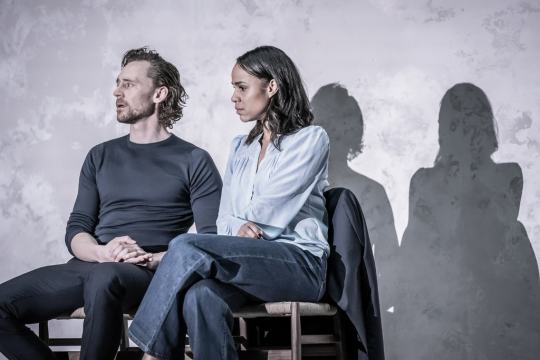
In this country, Mr. Hiddleston is mainly a screen star, known also for playing Jonathan Pine in the John le Carré series “The Night Manager” on AMC. There are plans, too, for him to bring Loki to Disney’s streaming service in a stand-alone series.
But at home in London, he has amassed some impressive Shakespearean credits, including the title roles in Kenneth Branagh’s “Hamlet” and Josie Rourke’s “Coriolanus,” and a turn as Cassio in Michael Grandage’s “Othello” — a production that Pinter, saw some months before he died in 2008. That was the year Mr. Hiddleston won a best newcomer Olivier Award for Cheek by Jowl’s “Cymbeline.”
Jamie Lloyd’s “Betrayal,” which has a staging to match the spareness of Pinter’s language and a roiling well of squelched emotion to feed its comedy, is Mr. Hiddleston’s Broadway debut. Likewise for his co-stars, Zawe Ashton (of Netflix’s “Velvet Buzzsaw”), who plays Emma, Robert’s wife; and Charlie Cox (of Netflix’s “Daredevil”), who plays Emma’s lover, Jerry, Robert’s oldest friend.
Beginning at what appears to be the end of Robert and Emma’s marriage, after her yearslong affair with Jerry has sputtered to a stop, it’s a drama of cascading double-crosses. First staged by Peter Hall in London in 1978 — and in 1980 on Broadway, where it starred Roy Scheider, Blythe Danner and Raul Julia — it rewinds through time to the sozzled evening when Emma and Jerry overstep the line.
The most recent Broadway revival was just six years ago, directed by Mike Nichols and starring Daniel Craig as Robert, Rachel Weisz as Emma and Rafe Spall as Jerry. It might seem too soon for another, let alone one with sexiness to spare — except that Mr. Lloyd’s production is also marked by a palpable hauntedness and a profound sense of loss.
Reviewing the London staging in The New York Times, Matt Wolf called it “a benchmark achievement for everyone involved,” showing the play “in a revealing, even radical, new light.” Michael Billington, in The Guardian, called Mr. Hiddleston’s performance “superb.”
What’s curious is that Mr. Hiddleston, so good at bad boys, isn’t playing Jerry, the more glamorous role: the cad, the pursuer, the best man who goes after the bride. But Mr. Lloyd said that casting him that way was never part of their discussions.
Last fall, when Mr. Lloyd persuaded Mr. Hiddleston to read a scene with Ms. Ashton for a one-night gala celebration of Pinter in London, part of the season-long Pinter at the Pinter series, there was no grand plan. Having asked Mr. Hiddleston about a possible collaboration for years, since “just before he became ridiculously famous,” Mr. Lloyd said, this was the first time he got a yes.
“I just really admired his craft of acting, the precision of his acting, as well as his real emotional depth and his real wit,” Mr. Lloyd said. “And he’s turned into what I think is the epitome of a great Pinter actor. Because if you’re in a Pinter play, you have to dig really deep and connect to terrible loss or excruciating pain, often massive volcanic emotion, and then you have to bottle it all up. You have to suppress it all.”
This, he added, is what Mr. Hiddleston does in “Betrayal,” where characters’ meaning is found between and behind the words, not inside them.
“Some of the pain that he’s created in Robert, it’s just unbearable, and yet he always keeps a lid on it,” Mr. Lloyd said.
The scene Mr. Hiddleston and Ms. Ashton read at the gala appears at the midpoint of “Betrayal”: Robert and Emma on vacation in Venice, at a moment that leaves their marriage with permanent damage. Within days, Mr. Hiddleston told Mr. Lloyd that he was on board for a full production.
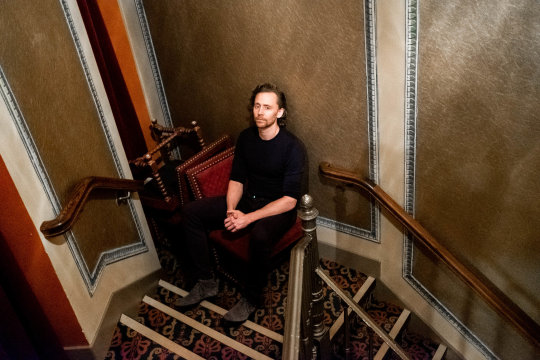
‘What remains private’
Photos taken, back in the faintly more lived-in of his Broadway dressing rooms, Mr. Hiddleston opened the window to let in some Midtown air — and when you’re as tall as he is, 6 feet 2 inches, opening it from the top of the window frame is easy enough to do. Then, making himself an espresso with his countertop machine, he sat down to talk at length.
“I’m always curious about the presentation of a character’s external persona versus the interior,“ he said. “What remains private, hidden, concealed, protected, and what does the character allow to be seen? We all have a very complex internal world, and not all of that is on display in our external reality.”
He can tick off the ways that various characters of his conceal what’s inside: Loki, with all that rage and vulnerability “tucked away”; the ultra-proper spy Jonathan Pine, in “The Night Manager,” “hiding behind his politeness”; Robert, a lonely man wearing “a mask of control” that renders him “confident, powerful, polished,” at least as far as any onlookers can tell.
In “Betrayal,” each of the three principals has an enormous amount to hide from the people who are meant to be their closest intimates. It’s a play about power and manipulation, duplicity and misplaced trust, and what’s so threatening about it is the very ordinariness of its privileged milieu. This snug little world that once seemed so safe and ideal — the happiest of families, the oldest of friends — has long since fallen apart.
But to Mr. Hiddleston, Pinter’s drama contains two themes just as significant as betrayal: isolation and loneliness.
“The sadness in the play — it’s not only sadness; because it’s Pinter, there’s wit and levity as well — but if there is sadness in the play,” he said, “I think it comes from the fact that these betrayals render Robert, Emma and Jerry more alone than they were before.”
Trust and self-protection
One-on-one, Mr. Hiddleston was more cautious than he’d been during the photo shoot, surrounded then by a gaggle of people affiliated with the show. Still, when I asked him about betrayal, lowercase, he went straight to the condition it violates.
“To trust is a profound commitment, and to trust is to make oneself vulnerable,” he said, fidgeting with a red rubber band and choosing his words with care. “It’s such an optimistic act, because you’re putting your faith in the hands of someone or something which you expect to remain constant, even if the circumstances change.”
“I’m disappearing down a rabbit hole here,” he said, “but I think about it a lot. I think about certainty and uncertainty. Trust is a way of managing uncertainty. It’s a way of finding security in saying, ‘Perhaps all of this is uncertain, but I trust you.’ Or, ‘I trust this.’ And there’s a lot of uncertainty in the world at the moment, so it becomes harder to trust, I suppose.”
An interview itself is an act of trust, albeit often a wary one. And there was one stipulated no-go zone in this encounter, a condition mentioned by a publicist only after I’d arrived: No talk of Taylor Swift, with whom Mr. Hiddleston had a brief, intense, headline-generating romance that, post-breakup, she evidently spun into song lyrics.
That was three years ago, and I hadn’t been planning to bring her up; given the context of the play, though, make of that prohibition what you will. Mr. Hiddleston, who once had a tendency to pour his heart out to reporters, knows that he can’t stop you.
“It’s not possible, and nor should it be possible, to control what anyone thinks about you,” he said. “Especially if it’s not based in any, um —” he gave a soft, joyless laugh — “if it’s not based in any reality.”

That’s something he’s learned about navigating fame — about being put on a pedestal that’s then kicked out from under him. He knows now “to let go of the energy that comes toward me, be it good or bad,” he said. “Because naturally in the early days I took responsibility for it.”
“And yes, I’m protective about my internal world now in probably a different way,” he added, his tone as restrained as his words. He took a beat, and so much went unsaid in what he said next: “That’s because I didn’t realize it needed protecting before.”
Even so, he doesn’t give the impression of having closed himself off. When something genuinely made him laugh, he smiled a smile that cracked his face wide open.
And the way he treated the people around him at work — with a fundamental respect, regardless of rank, and no whiff of flattery — made him seem sincere about what he called “staying true to the part of myself that’s quite simple, that’s quite ordinary.”
That investment in his ordinariness, as he put it, is a hedge against the destabilizing trappings of fame, but it doubles as a way of protecting his craft.
It’s also of a piece with his insistence that vulnerability is a necessary risk to take, at least sometimes.
“If you go through life without connecting to people,” he asked, “how much could you call that a life?”
117 notes
·
View notes
Link
Tom Hiddleston was posing for a portrait, and the face he showed the camera wasn’t entirely his own.
That had been his idea, to slip for a few moments into the character he’s playing on Broadway, in Harold Pinter’s “Betrayal”: Robert, the cheated-on husband and backstabbed best friend whose coolly proper facade is the carapace containing a crumbling man. And when Mr. Hiddleston became him, the change was instantaneous: the guarded stillness of his body, the chill reserve in his gray-blue eyes.
“It’s interesting,” Mr. Hiddleston said after a while, analyzing Robert’s expression from the inside. “It gives less away.” A pause, and then his own smile flickered back, its pleasure undisguised. “O.K.,” Mr. Hiddleston announced, himself again, “it’s not Robert anymore.”
It was late on a muggy August morning, one day before the show’s first preview at the Bernard B. Jacobs Theater, and Mr. Hiddleston — the classically trained British actor best known for playing the winsomely chaotic villain Loki, god of mischief and brother of Thor, in the Marvel film franchise — had been in New York for less than a week.

He’ll be here all autumn for the limited run of the production, a hit in London earlier this year, but he wasn’t going to pretend that he’d settled in. “I literally have never sat in this room before,” he’d said at the top of the photo shoot, in his cramped auxiliary dressing room, next door to the similarly tiny one he had been occupying.
He’d had nothing to do with the space’s camera-ready décor. So there was no use making a metaphor of the handsome clock with its hands stopped at 12 (“Betrayal” is famous for its reverse chronology; far more apt if the clock had run backward), or of the compact stack of pristine books that looked like journals, with pretty covers and presumably empty pages: a bit off-brand for Mr. Hiddleston, who at 38 has a model-perfect exterior with quite a lot inscribed inside.
Take the matter-of-fact way he said, in explaining that he’d first encountered Pinter’s work when he studied for his A-levels in English literature, theater, Latin and Greek: “It was a real tossup between French and Spanish or Latin and Greek. I thought, I can always speak French and Spanish, I can’t always read Latin and Greek, so I’ll study that and I’ll speak the other two.”
Though, to be fair, he only said that because I’d teased him slightly about the Latin and Greek, and I’d teased him — not a recommended journalistic technique — because he was so disarmingly good-humored and resolutely down to earth, chatting away as he waited for the photographer to set up a shot. It didn’t seem like it would ruffle him. He laughed, actually.
From a one-night reading to Broadway

In this country, Mr. Hiddleston is mainly a screen star, known also for playing Jonathan Pine in the John le Carré series “The Night Manager” on AMC. There are plans, too, for him to bring Loki to Disney’s streaming service in a stand-alone series.
But at home in London, he has amassed some impressive Shakespearean credits, including the title roles in Kenneth Branagh’s “Hamlet” and Josie Rourke’s “Coriolanus,” and a turn as Cassio in Michael Grandage’s “Othello” — a production that Pinter, saw some months before he died in 2008. That was the year Mr. Hiddleston won a best newcomer Olivier Award for Cheek by Jowl’s “Cymbeline.”
Jamie Lloyd’s “Betrayal,” which has a staging to match the spareness of Pinter’s language and a roiling well of squelched emotion to feed its comedy, is Mr. Hiddleston’s Broadway debut. Likewise for his co-stars, Zawe Ashton (of Netflix’s “Velvet Buzzsaw”), who plays Emma, Robert’s wife; and Charlie Cox (of Netflix’s “Daredevil”), who plays Emma’s lover, Jerry, Robert’s oldest friend.
Beginning at what appears to be the end of Robert and Emma’s marriage, after her yearslong affair with Jerry has sputtered to a stop, it’s a drama of cascading double-crosses. First staged by Peter Hall in London in 1978 — and in 1980 on Broadway, where it starred Roy Scheider, Blythe Danner and Raul Julia — it rewinds through time to the sozzled evening when Emma and Jerry overstep the line.
The most recent Broadway revival was just six years ago, directed by Mike Nichols and starring Daniel Craig as Robert, Rachel Weisz as Emma and Rafe Spall as Jerry. It might seem too soon for another, let alone one with sexiness to spare — except that Mr. Lloyd’s production is also marked by a palpable hauntedness and a profound sense of loss.
Reviewing the London staging in The New York Times, Matt Wolf called it “a benchmark achievement for everyone involved,” showing the play “in a revealing, even radical, new light.” Michael Billington, in The Guardian, called Mr. Hiddleston’s performance “superb.”
What’s curious is that Mr. Hiddleston, so good at bad boys, isn’t playing Jerry, the more glamorous role: the cad, the pursuer, the best man who goes after the bride. But Mr. Lloyd said that casting him that way was never part of their discussions.
Last fall, when Mr. Lloyd persuaded Mr. Hiddleston to read a scene with Ms. Ashton for a one-night gala celebration of Pinter in London, part of the season-long Pinter at the Pinter series, there was no grand plan. Having asked Mr. Hiddleston about a possible collaboration for years, since “just before he became ridiculously famous,” Mr. Lloyd said, this was the first time he got a yes.
“I just really admired his craft of acting, the precision of his acting, as well as his real emotional depth and his real wit,” Mr. Lloyd said. “And he’s turned into what I think is the epitome of a great Pinter actor. Because if you’re in a Pinter play, you have to dig really deep and connect to terrible loss or excruciating pain, often massive volcanic emotion, and then you have to bottle it all up. You have to suppress it all.”
This, he added, is what Mr. Hiddleston does in “Betrayal,” where characters’ meaning is found between and behind the words, not inside them.
“Some of the pain that he’s created in Robert, it’s just unbearable, and yet he always keeps a lid on it,” Mr. Lloyd said.
The scene Mr. Hiddleston and Ms. Ashton read at the gala appears at the midpoint of “Betrayal”: Robert and Emma on vacation in Venice, at a moment that leaves their marriage with permanent damage. Within days, Mr. Hiddleston told Mr. Lloyd that he was on board for a full production.
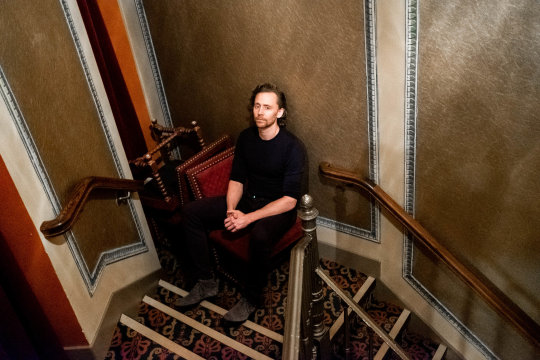
‘What remains private’
Photos taken, back in the faintly more lived-in of his Broadway dressing rooms, Mr. Hiddleston opened the window to let in some Midtown air — and when you’re as tall as he is, 6 feet 2 inches, opening it from the top of the window frame is easy enough to do. Then, making himself an espresso with his countertop machine, he sat down to talk at length.
“I’m always curious about the presentation of a character’s external persona versus the interior,“ he said. “What remains private, hidden, concealed, protected, and what does the character allow to be seen? We all have a very complex internal world, and not all of that is on display in our external reality.”
He can tick off the ways that various characters of his conceal what’s inside: Loki, with all that rage and vulnerability “tucked away”; the ultra-proper spy Jonathan Pine, in “The Night Manager,” “hiding behind his politeness”; Robert, a lonely man wearing “a mask of control” that renders him “confident, powerful, polished,” at least as far as any onlookers can tell.
In “Betrayal,” each of the three principals has an enormous amount to hide from the people who are meant to be their closest intimates. It’s a play about power and manipulation, duplicity and misplaced trust, and what’s so threatening about it is the very ordinariness of its privileged milieu. This snug little world that once seemed so safe and ideal — the happiest of families, the oldest of friends — has long since fallen apart.
But to Mr. Hiddleston, Pinter’s drama contains two themes just as significant as betrayal: isolation and loneliness.
“The sadness in the play — it’s not only sadness; because it’s Pinter, there’s wit and levity as well — but if there is sadness in the play,” he said, “I think it comes from the fact that these betrayals render Robert, Emma and Jerry more alone than they were before.”
Trust and self-protection
One-on-one, Mr. Hiddleston was more cautious than he’d been during the photo shoot, surrounded then by a gaggle of people affiliated with the show. Still, when I asked him about betrayal, lowercase, he went straight to the condition it violates.
“To trust is a profound commitment, and to trust is to make oneself vulnerable,” he said, fidgeting with a red rubber band and choosing his words with care. “It’s such an optimistic act, because you’re putting your faith in the hands of someone or something which you expect to remain constant, even if the circumstances change.”
“I’m disappearing down a rabbit hole here,” he said, “but I think about it a lot. I think about certainty and uncertainty. Trust is a way of managing uncertainty. It’s a way of finding security in saying, ‘Perhaps all of this is uncertain, but I trust you.’ Or, ‘I trust this.’ And there’s a lot of uncertainty in the world at the moment, so it becomes harder to trust, I suppose.”
An interview itself is an act of trust, albeit often a wary one. And there was one stipulated no-go zone in this encounter, a condition mentioned by a publicist only after I’d arrived: No talk of Taylor Swift, with whom Mr. Hiddleston had a brief, intense, headline-generating romance that, post-breakup, she evidently spun into song lyrics.
That was three years ago, and I hadn’t been planning to bring her up; given the context of the play, though, make of that prohibition what you will. Mr. Hiddleston, who once had a tendency to pour his heart out to reporters, knows that he can’t stop you.
“It’s not possible, and nor should it be possible, to control what anyone thinks about you,” he said. “Especially if it’s not based in any, um —” he gave a soft, joyless laugh — “if it’s not based in any reality.”
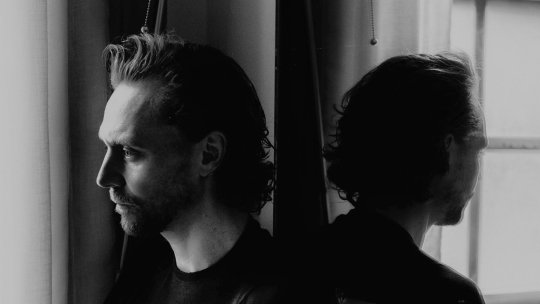
That’s something he’s learned about navigating fame — about being put on a pedestal that’s then kicked out from under him. He knows now “to let go of the energy that comes toward me, be it good or bad,” he said. “Because naturally in the early days I took responsibility for it.”
“And yes, I’m protective about my internal world now in probably a different way,” he added, his tone as restrained as his words. He took a beat, and so much went unsaid in what he said next: “That’s because I didn’t realize it needed protecting before.”
Even so, he doesn’t give the impression of having closed himself off. When something genuinely made him laugh, he smiled a smile that cracked his face wide open.
And the way he treated the people around him at work — with a fundamental respect, regardless of rank, and no whiff of flattery — made him seem sincere about what he called “staying true to the part of myself that’s quite simple, that’s quite ordinary.”
That investment in his ordinariness, as he put it, is a hedge against the destabilizing trappings of fame, but it doubles as a way of protecting his craft.
It’s also of a piece with his insistence that vulnerability is a necessary risk to take, at least sometimes.
“If you go through life without connecting to people,” he asked, “how much could you call that a life?”
#tom hiddleston#betrayal#betrayal broadway#harold pinter#bernard b jacobs theatre#theatre#broadway#jamie lloyd#zawe ashton#charlie cox#the new york times
111 notes
·
View notes
Text

Thanks Beverly Wilson for confirming Betty is gay and Taylor Swift performed a gay country song at the AMC awards
1 note
·
View note